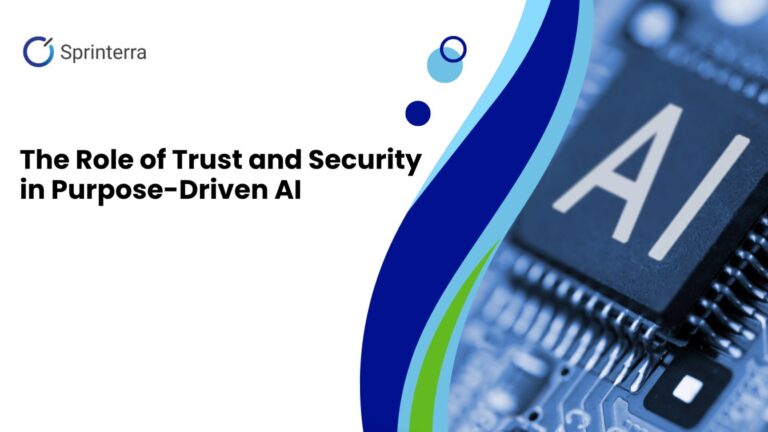Introduction: Purpose-Driven AI Must Be Built on Trust
In today’s digital age, artificial intelligence (AI) is rapidly transforming the way businesses operate, especially for small and midsized businesses (SMBs) that are looking to stay competitive, efficient, and innovative. Through our “AI That Works for You” blog series, Acumatica has highlighted how we’re delivering AI innovations that are not just cutting-edge but also practical, responsible, and rooted in real-world value. From seamlessly integrating AI into daily workflows to envisioning the future with digital co-workers and interactive assistants, we are committed to delivering AI that empowers.
But none of these matters without one essential foundation: trust. Trust is what enables organizations to confidently adopt new technologies. And when it comes to purpose-driven AI, trust begins and ends with security.

At Acumatica, security is not a bolt-on feature. It is deeply embedded in our DNA and a central component of how we build, deploy, and scale AI-powered cloud ERP solutions.
Our Customer Bill of Rights ensures that every user of our ERP platform has a complete and transparent security model. This includes full access to your data in usable formats and complete control over application access, reports, devices, and more. These rights don’t just apply to traditional software modules they extend to every AI capability we introduce.
We take a multi-layered approach to security, including:
And when it comes to AI, we go even further. Our Large Language Models (LLMs) are private, meaning your business data is never used to train public LLMs. There’s no exposure, no data sharing, and no surprises. Every new AI feature is rigorously assessed to ensure it aligns with privacy-by-design principles, reinforcing our commitment to protecting your information every step of the way.
Security isn’t just about locks and protocols, it’s also about ongoing, intelligent monitoring. We leverage powerful machine-learning algorithms to analyze system telemetry data, monitor cloud infrastructure, and proactively enhance performance and stability.
Here’s how this works in practice:
This proactive monitoring means less downtime, smoother operations, and an overall better experience with our ERP system. In fact, Acumatica is engineered to achieve less than one hour of unplanned downtime per year, thanks to our automated recovery systems and geographically distributed infrastructure.
At Acumatica Summit 2025, we unveiled our next-generation maintenance automation initiative, a revolutionary system that uses Acumatica AI to make system updates smarter and less disruptive.
This initiative includes:
The result? A consistently up-to-date system, with the latest performance enhancements and security patches, deployed efficiently and reliably with virtually no downtime.
In an environment where every minute counts, this level of automation is not just a luxury it’s a strategic advantage.
As AI evolves, so do we. Acumatica is continuously investing in:
Our mission is to help SMBs thrive with AI that is both practical and purposeful, backed by the strongest foundations of trust and security. With Acumatica, you’re not just deploying an ERP system, you’re choosing a technology partner committed to protecting your data, respecting your rights, and empowering your business to grow.
The future of ERP lies in secure, responsible, and purpose-driven AI. At Acumatica, trust is not an afterthought, it’s the cornerstone of every feature we build and every innovation we deploy.
We believe AI should work for you, not complicate your processes or compromise your data. By focusing on trustworthy architecture, intelligent monitoring, and forward-thinking automation, we’re enabling businesses like yours to harness the full power of AI confidently and securely.
Learn more about how Acumatica’s AI-first strategy is shaping the future safely, smartly, and with your business in mind. Contact us today.
Get the latest insights on exponential technologies delivered straight to you
We use cookies to improve your experience on our site. By using our site, you consent to cookies.
Manage your cookie preferences below:
Essential cookies enable basic functions and are necessary for the proper function of the website.
Google reCAPTCHA helps protect websites from spam and abuse by verifying user interactions through challenges.
Google Tag Manager simplifies the management of marketing tags on your website without code changes.
Statistics cookies collect information anonymously. This information helps us understand how visitors use our website.
Google Analytics is a powerful tool that tracks and analyzes website traffic for informed marketing decisions.
Service URL: policies.google.com (opens in a new window)
Clarity is a web analytics service that tracks and reports website traffic.
Service URL: clarity.microsoft.com (opens in a new window)
Marketing cookies are used to follow visitors to websites. The intention is to show ads that are relevant and engaging to the individual user.
LinkedIn Insight is a web analytics service that tracks and reports website traffic.
Service URL: www.linkedin.com (opens in a new window)
You can find more information in our Cookie Policy and Privacy Policy.